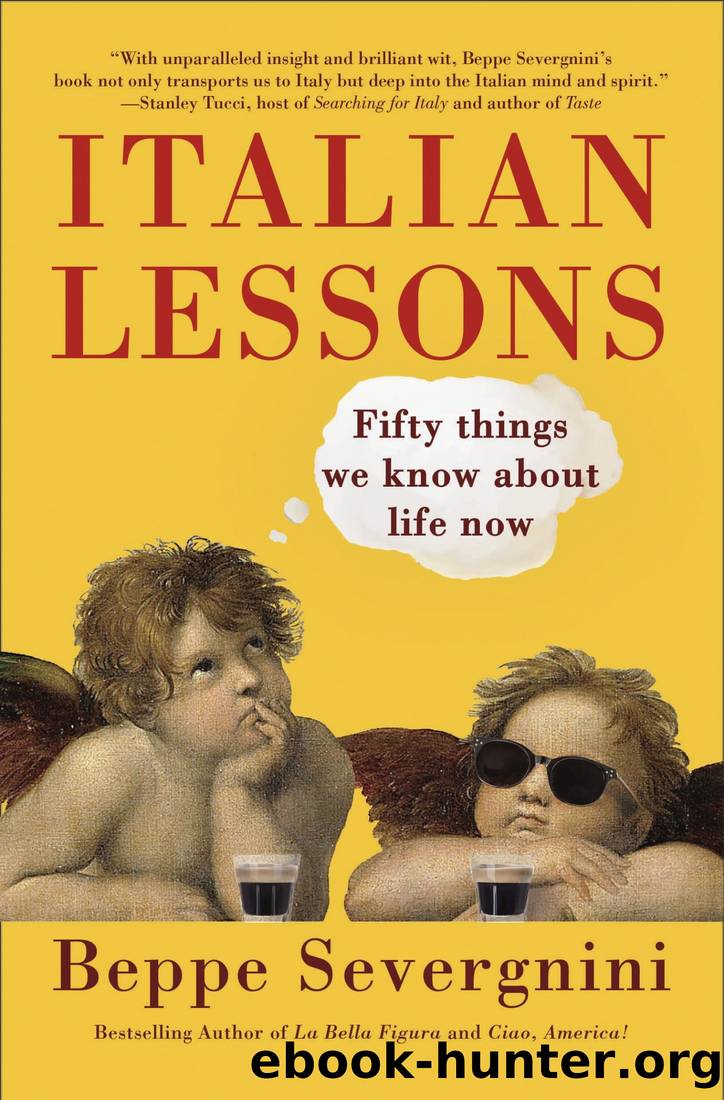Italian Lessons: Fifty Things We Know About Life Now by Beppe Severgnini

Author:Beppe Severgnini [Severgnini, Beppe]
Language: eng
Format: epub
ISBN: 9780593315637
Publisher: Knopf
Published: 2022-05-03T00:00:00+00:00
26. Because many criticize us, but nearly everyone copies us
I have always wondered what it is about us Italians that so captivates foreigners. This isnât a fable that we tell to console ourselves; itâs true. Iâve observed this attraction at work all over the world. Italy enjoys a special indulgence afforded no other nation on Earth.
One explanation is geopolitical. We stopped being conquerors 1,700 years ago, if, that is, we wish to include the Roman emperors among our ancestors. As soon as we tried our hand at it again, we piled up a collection of disasters. The dream of African empire embraced first by Prime Minister Giovanni Giolitti and later by Mussolini failed miserably. We Italians have, sadly, committed our share of atrocities, and this must not be forgiven nor forgotten. But weâve always been amateur imperialists: our limited attention span as conquistadors has lightened our guilt and helped our reputation.
Another possible explanation is demographic. Over the past 150 years, Italy has filled the world with emigrants, around thirty-five million of them, ranging from the Venetian peasants who set out for Brazil all the way up to researchers following the siren song of opportunities in Boston or California. They have been hard workers, sociable and convivial, open to new ideas. Maybe not always; occasionally these qualities developed in a younger generation. But once our emigrants emerge from their shell, they tend to participate. In the twentieth century, this has been the case in Germany, Switzerland, France, Belgium, Australia, South America, Canada, and the United States. Today, twenty million US citizens claim Italian ancestry. The list of Italian American politicians, actors, directors, singers, and scientists is virtually endless, from Frank Sinatra, Francis Ford Coppola, and Lady Gaga to Nancy Pelosi, Robert De Niro, and the immunologist Anthony Fauci, who kept President Trump from making things even worse.
Still, these considerations are not enough to explain the persistent allure we seem to exert on the peoples of other countries. There is, however, another explanation, which may prove more persuasive. The idea of Italy is bound up with pleasant concepts: art, landscape, quiet waters, fine food and wine, movies, music, fashion, and design. Sometimes these connections slip into the realm of the stereotype, encouraged by the low-effort promotion of tourism undertaken by so many Italian government agencies. International public opinion isnât particularly sophisticated, and admiration and condemnation are frequently superficial. Still, we tend to emerge pretty well (except perhaps for our politics) from this global court of judgment, overarching and hasty though it may be. So we have no reason to complain.
In my books and in many articles, I have done my best to delve into the reasons for this fascination. Iâve come to a conclusion: the dolce vita endures, but it is no longer a cinematic reference. Nor is it a caricature bound up with tourism. No, itâs an evocative image, an abiding temptation, and a reliable consolation. We Italians feel obliged to wage constant combat against the dictatorship of the picturesque, but
Download
This site does not store any files on its server. We only index and link to content provided by other sites. Please contact the content providers to delete copyright contents if any and email us, we'll remove relevant links or contents immediately.
| Belgium | France |
| Germany | Great Britain |
| Greenland | Italy |
| Netherlands | Romania |
| Scandinavia |
Room 212 by Kate Stewart(5107)
The Crown by Robert Lacey(4811)
Endurance: Shackleton's Incredible Voyage by Alfred Lansing(4773)
The Iron Duke by The Iron Duke(4352)
The Rape of Nanking by Iris Chang(4208)
Joan of Arc by Mary Gordon(4105)
Killing England by Bill O'Reilly(3999)
Say Nothing by Patrick Radden Keefe(3976)
I'll Give You the Sun by Jandy Nelson(3431)
Shadow of Night by Deborah Harkness(3361)
Hitler's Monsters by Eric Kurlander(3331)
Mary, Queen of Scots, and the Murder of Lord Darnley by Alison Weir(3208)
Blood and Sand by Alex Von Tunzelmann(3200)
Eleanor & Park by Rainbow Rowell(3157)
Darkest Hour by Anthony McCarten(3122)
Margaret Thatcher: The Autobiography by Thatcher Margaret(3081)
Book of Life by Deborah Harkness(2936)
Red Famine: Stalin's War on Ukraine by Anne Applebaum(2930)
The One Memory of Flora Banks by Emily Barr(2858)
